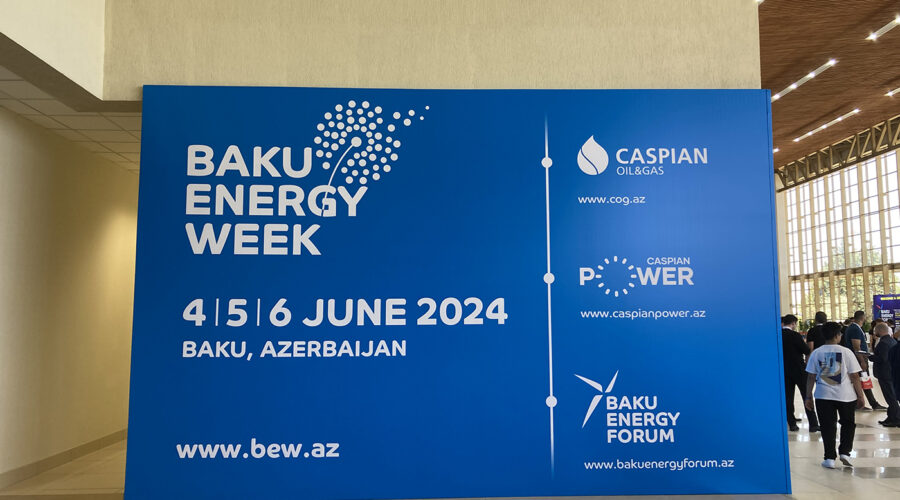As Europe attempts to wean itself off Russia’s natural gas and oil supplies, Azerbaijan is hoping to strengthen its role as a major energy producer. The South Caucasus nation of around 10 million people is pursuing both renewable energy and fossil fuel production, aiming to become a key player for Europe’s energy security.
Azerbaijan has been producing hydrocarbons for around 150 years. In 1846–1848, the first modern oil wells were drilled on the Absheron Peninsula north-east of Baku. In 1901, Azerbaijan produced 11 million tons of oil, accounting for over 50 percent of the world production. Now oil, gas, and related petroleum products account for 91 percent of the country’s total exports, although the authorities in Baku plan to significantly increase the share of renewables in the Azerbaijani energy export strategy.
“By the end of 2027, we will generate two gigawatts of renewable energy”, said Azerbaijani President Ilham Aliyev on June 4 at the Baku Energy Week – the event combining the 29th International Caspian Oil and Gas Exhibition, the 12th Caspian International Power and Green Energy Exhibition, and the 29th Baku Energy Forum.
 Although in 2023 renewable sources produced only seven percent of Azerbaijan’s electricity, the government plans to generate 30 percent of its energy capacity from renewables by 2030. It is, therefore, no surprise that on the sidelines of the Baku Energy Week, the United Arab Emirates’s Masdar corporation and Azerbaijan’s State Oil Company (SOCAR) signed a shareholder agreement for three wind and solar projects totaling one gigawatt.
Although in 2023 renewable sources produced only seven percent of Azerbaijan’s electricity, the government plans to generate 30 percent of its energy capacity from renewables by 2030. It is, therefore, no surprise that on the sidelines of the Baku Energy Week, the United Arab Emirates’s Masdar corporation and Azerbaijan’s State Oil Company (SOCAR) signed a shareholder agreement for three wind and solar projects totaling one gigawatt.
In 2022, Azerbaijani energy officials and Masdar signed the Memorandum of Understanding on cooperation in the field of renewable and clean energy in Nagorno-Karabakh – a mountainous region that has been under the Armenian control for three decades, but was fully recaptured by Azerbaijan in 2023. But the UAE-based company has still not built any green energy plants there. As its representatives told Global Comment, such plans exist, but are unlikely to be realized in the foreseeable future. Instead, Masdar will focus on other green energy projects in Azerbaijan.
In October 2023, the Abu Dhabi-based corporation built the first large-scale solar power plant in the former Soviet republic, which paved the way for further UAE investments in Azerbaijan. Prior to the Baku Energy Week, Aliyev and the UAE Minister of Industry and Advanced Technology Sultan bin Ahmed Al Jaber laid foundation stones for Neftchala, Bilasuvar solar power plants, and Absheron-Garadagh wind power plant.
Following in the Emirates’ footsteps, BP – the operator of several major projects in the Caspian Sea, including Shah Deniz field – is expected to begin building a solar power plant in Jabrayil, while companies from Saudi Arabia and Qatar are already involved in various green energy projects in Azerbaijan. All that indicates that Baku seeks to develop its renewable energy sector and become an exporter of green energy to European markets.
Since 2024 was declared the “Green World Solidarity Year” in Azerbaijan, renewables seem to have a special place in Baku’s energy policy. That, however, does not mean that the Caspian nation will reduce its fossil fuel production anytime soon.
“The important green energy potential of the Caspian Sea has a wide export potential along with oil and gas,” the US President Joe Biden said in a letter that was read at the opening of the Baku Energy Week.
His message seems to encourage Azerbaijan to continue increasing fossil fuels supplies to Europe, amid the European Union’s “energy divorce” from Russia. Although Baku has already increased natural gas exports to the European market, it also plans to help Europe diversify its energy imports.
In March 2023, SOCAR announced the start of transit of Kazakh oil through the Baku-Tbilisi-Ceyhan (BTC) pipeline to Europe. The primary goal of this project is to allow Kazakhstan to export its oil to European countries though Azerbaijan, rather than to the Caspian Pipeline Consortium – the route running through Russia and ending in its Black Sea terminal of Novorossiysk.
Moreover, Azerbaijani Ministry of Energy intends to resume pumping oil through the Baku-Supsa pipeline that has been out of service since 2022, which will help Kazakhstan sell its oil to Europe via Azerbaijan, effectively bypassing Russia. But in order for this route to become fully operational, Astana and Baku will have to resolve technical issues, namely the quality characteristics of the oils passing through the pipeline.
Meanwhile, Azerbaijan will likely also focus on the establishment of the industrial-scale renewable energy power, namely the creation of the Green Energy Zone in its regions of Karabakh, Eastern Zangazur and Nakhchivan. Baku will also prepare to host the 2024 United Nations Climate Change Conference (COP29), which is a significant pro-green energy event.
All that is part of Baku’s strategy of developing its green energy sector in order to supply Europe not only with oil and gas, but also with “green electricity”. Once the 1,100-kilometer (683,5 miles) electricity cable, running from Azerbaijan to Romania, is laid under the Black Sea, European countries will additionally reduce their energy dependance on Russia. And that will almost certainly be another Moscow’s geostrategic defeat.
Image credits: Nikola Mikovic

